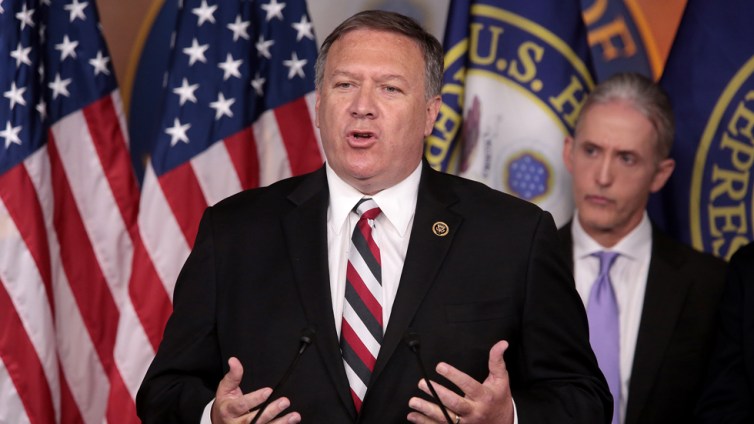Iranian officials have voiced concern over the future of the Joint Comprehensive Plan of Action (JCPOA), better known as the nuclear deal, after U.S. President Donald Trump announced the sacking of his Secretary of State, Rex Tillerson.
“If the U.S. quits the nuclear agreement, we will also quit it,” Iran’s Assistant Foreign Minister for Political Affairs Abbas Araghchi said, according to ISNA news agency. “We told the Europeans that if they did not convince the U.S. to save the agreement, Iran will also leave the deal.”
Iranians are particularly concerned about Tillerson’s firing because there is speculation that he was at odds with Trump over the standing of the deal. Trump is known to be a hardliner when it comes to Iran, and campaigned on a promise to scrap the deal – made under the Obama administration – if he was elected.
On March 13, President Trump announced that the current CIA Director and former Tea Party Congressman Mike Pompeo, also known for his tough stance towards Iran, will replace Tillerson.
The JCPOA was signed in July 2015, after several years of negotiations between the UN Security Council’s five permanent members plus Germany, dubbed the “P5 + 1.” In exchange for Iran curbing its nuclear program, international nuclear-related sanctions that had been slapped on Iran had been lifted, starting in 2016 under the terms of the JCPOA, as well as granting Iran access to frozen capital.
On January 30, Trump asked the Congress to address the flaws in what he termed was a "terrible Iran nuclear deal." Earlier this month Trump announced he would waive the sanctions on Iran as required by the nuclear agreement but for the last time, and he also threatened to withdraw the United States from the agreement if it is not amended.
Trump is still threatening to scrap the nuclear deal unless tough new restrictions are placed on Iran before May 12, when he must certify to Congress that Iran is in good standing under the current version of the deal.
Tillerson had tried to work out a side agreement with France, the U.K, and Germany that would enable the United States to stay in the deal, but with Pompeo coming on board as Secretary of State, Iranians worry that Tillerson’s efforts will fall by the wayside.
The Iranian Javan newspaper said that replacing Tillerson with Pompeo signaled the end of the deal, writing that “for quitting the deal, [Tillerson’s] dumping was necessary.”
Iran’s Foreign Ministry spokesman Bahram Qassemi said that “such replacements in the U.S. establishment are not surprising. We have witnessed many changes in the incumbent administration so far,” referring to the numerous changes Trump has made to his personnel since taking office over one year ago.
“What is important for the Islamic Republic is America’s policy in global affairs and their interaction with us, and we will adopt our own positions,” the Iranian Students News Agency cited Qassemi as saying on March 14.
In a letter sent to Congress on March 13, Trump wrote that Iran “pose[s] an unusual and extraordinary threat to the national security, foreign policy and economy of the United States,” extending what is described as a national emergency with regards to Iran. Under the law, the U.S. president has extraordinary powers, including the ability to seize property, summon the National Guard and hire and fire military officers at will. It also forms the basis for most American sanctions against other countries.
Although the nuclear deal lifted nuclear-related sanction, the U.S. kept in place – and even increased – sanctions against Iran’s financial sector and individuals linked to the Iranian Revolutionary Guard Corps for its ballistic missile programs, and other activities U.S. officials say links Iran to terrorism.







 Azerbaijan and Armenia started the process of demarcation of their border on Tuesday, with the installation of the first border markers based on ge...
Azerbaijan and Armenia started the process of demarcation of their border on Tuesday, with the installation of the first border markers based on ge...
 President Aliyev emphasized the critical role of the North-South Transport Corridor in fostering transport cooperation between Azerbaijan and Russi...
President Aliyev emphasized the critical role of the North-South Transport Corridor in fostering transport cooperation between Azerbaijan and Russi...
 Armenian sappers commenced on Monday mine-clearance operations in the territories adjacent to the Saint Mary Church in village of Voskepar (Armenia...
Armenian sappers commenced on Monday mine-clearance operations in the territories adjacent to the Saint Mary Church in village of Voskepar (Armenia...
 Russian Foreign Minister Sergei Lavrov has reasserted that Moscow has no intentions to stop the fighting in Ukraine, even if peace talks commence.
Russian Foreign Minister Sergei Lavrov has reasserted that Moscow has no intentions to stop the fighting in Ukraine, even if peace talks commence.
 Iran and Pakistan have signed eight cooperation documents in various fields, and agreed to strengthen ties to fight terrorism in the region.
Iran and Pakistan have signed eight cooperation documents in various fields, and agreed to strengthen ties to fight terrorism in the region.



